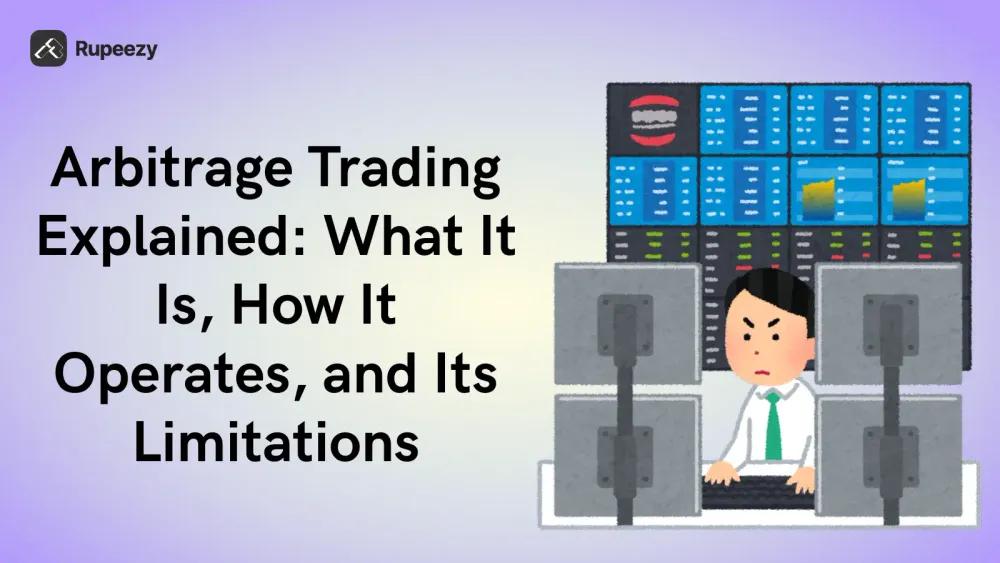Arbitrage Trading Explained: What It Is, How It Operates, and Its Limitations


00:00 / 00:00
One of the primary aims of traders, apart from earning profits, is to reduce the overall risk associated with the trades they make. Well, this is true, but it is not as easy as it is said. For this, you need to have a detailed and deep market understanding. You must know how to perform financial and technical analysis. And most importantly, you need to have time to complete all these.
But at the same time, there is a method of trading that helps you with all these facets. It is known as arbitrage trading. This is a method where you buy and sell the assets in different markets at the same time. This allows you to gain from the price differences prevailing in the market.
While this difference might be less at times, when multiple such trades occur at the same time, you can earn a good profit. But still, this is just the surface picture of what arbitrage trading is. To know the details of the arbitrage trading in India, read this guide.
What Is Arbitrage Trading?
Arbitrage trading is the practice of taking advantage of price differences of the same asset across two or more markets. In simple terms, it means buying a stock or share, commodity, or currency in the market where the price is low. Then sell these in the market where the price is higher. The difference between these two prices becomes the trader’s profit.
But the catch is to do it really quickly. Such a price gap exists for a very low time period. So, you would need to use a method like algo trading or computer software to ensure you do not miss the opportunity.
While you are performing these trades, ensure that you do not confuse this with leverage trading. You would need to invest your funds, and the margin is not usually a part of this trading. This is why proper analysis and timely response are the key to arbitrage trading profits. In India, arbitrage trading is widely seen in equity, commodity, and currency markets.
To understand this better, let us quickly look at an example over here.
Example of Arbitrage Trading
Say there is a stock A. This stock is trading at Rs. 1,000 on the NSE (National Stock Exchange) and at Rs. 1,005 on the BSE (Bombay Stock Exchange).
An arbitrage trader notices this small price difference. The trader now performs the following actions:
Buys 100 shares from NSE at Rs. 1,000 each.
Sell them on BSE at Rs. 1,005 at the same time.
Now, if you see the price difference on one share is just Rs. 5. This might seem low. But let us now calculate the overall profit for the trader here:
Profit = (Selling Price – Buying Price) × Quantity
= (Rs. 1,005 – Rs. 1,000) × 100 = Rs. 500 (excluding brokerage and taxes)
This Rs. 500 profit may seem small, but such opportunities occur frequently. So, if you do multiple such trades daily, you can earn good profits. Also, this will help you reduce the risk as well.
How Arbitrage Trading Operates
Arbitrage trading works by identifying and acting upon short-term price differences. This is done for the same asset across two or more markets. Traders aim to buy low and sell high simultaneously. The main aim here is to make a small yet guaranteed profit. Here’s how it operates step by step.
1. Identifying Price Difference
The first step is spotting a price mismatch. Ensure that this is done for the same stock, commodity, or currency across different yet working stock exchanges from the list. For example, if a stock trades at Rs. 1,000 on NSE and Rs. 1,005 on BSE. This is an opportunity for you to create an arbitrage opportunity.
2. Executing Simultaneous Orders
Now, you would need to lock in the profit. So, for this, you would need to trade in the mentioned stock exchanges at the same time. Remember that the price changes very quickly, so be sure that you complete the trade as fast as possible. If not, your profits can be impacted.
3. Leveraging Technology
You need to leverage this opportunity. The difference is there only for some seconds, and so you would need to take the help of the technology. This is where you can benefit from algo trading greatly. Proper commands and automated systems will ensure that trade is completed on time.
4. Market Adjustment
As many traders take advantage of this difference, you will see that the market stability is reached quickly. Once that is attained, the window for earning will close, and you will no longer be able to benefit from the arbitrage.
Types of Arbitrage Trading
When it comes to arbitrage trading, you must first know what kind of trade this will be. Well, this is where it becomes important that you know the key types of arbitrage trading so that you can make the right call.
1. Spatial Arbitrage
This involves buying and selling the same asset. You will do the trade in the same asset but on different exchanges, like NSE or BSE. The goal is to profit from the difference in prices at the same time.
2. Statistical Arbitrage
It uses mathematical models and algorithms. The aim here is to predict short-term price discrepancies between related assets. This is data-driven and a bit complicated. Hence, institutional investors go for this one more.
3. Triangular Arbitrage
This occurs in the currency market. Here, the traders gain benefit from the exchange rate differences among the three currencies. For instance, trading between USD, EUR, and INR. This will allow the trader to gain profit from rate changes.
4. Merger Arbitrage
Traders use this strategy during mergers or acquisitions. They buy shares of the target company. Then they sell shares of the acquiring company. This will help in gaining the profits from the same.
5. Futures Arbitrage
This happens when there is a difference between the spot price of an asset and its futures price. Traders buy in the spot market and sell in the futures market, or vice versa, to benefit from price convergence.
Arbitrage Trading Strategies
Arbitrage trading strategies help traders act quickly and efficiently. It allows the traders to make a profit from the price differences in the market. And all this happens with the proper management of risks. The profits are improved, and this helps the traders greatly. But you must focus on the right strategy for you.
So, here are the options for you:
1. Market Arbitrage Strategy
This is the simplest form of arbitrage. Traders buy a stock from one exchange where the price is lower and sell it simultaneously on another where it is higher. For example, buying a stock at Rs. 1,000 on NSE and selling it at Rs. 1,005 on BSE.
2. Convertible Arbitrage Strategy
This involves buying a company’s convertible bonds and short-selling its equity shares. Traders profit when the bond price and stock price realign after market corrections.
3. Merger Arbitrage Strategy
It is used during mergers or acquisitions. This strategy includes buying the target company’s shares and selling the acquiring company’s shares. The aim is to benefit from the price changes that will be there once the merger is done.
4. Statistical Arbitrage Strategy
This is a data-based strategy. This is the one where the traders use algorithms to find and exploit small pricing inefficiencies. It relies on historical data. Understanding of the quantitative models to predict short-term price corrections is important here.
5. Index Arbitrage Strategy
This strategy works when there is a difference between the price of a stock index and the total value of its underlying stocks. Traders profit by buying or selling the index futures and the component stocks to close the gap.
Pros and Cons of Arbitrage Trading
Arbitrage trading is a legitimate form of trading that has been approved by SEBI as well. But unlike any other form of trading, there are certain pros and cons to this as well. Knowing them can help you make the right decision and reduce the overall losses.
Let us explore them here.
Pros
Reduced risk due to limited market exposure.
High chances of making profits and reducing losses.
Usually, short-term trades as these work on the gaps in the market.
Maintains market efficiency by correcting price imbalances.
Applicable across markets, including stocks, futures, and currencies.
Cons
Small profit margins, which can be a bit unhappening.
Multiple trades at the same time are needed for better outcomes.
High transaction costs can eat into overall returns.
Requires fast technology and automation for timely trades.
Opportunities are short-lived as prices adjust quickly.
Conclusion
Arbitrage trading is one of the smartest ways to profit from temporary price differences across markets. It is a type of trading that offers you low risk, but when done properly, can ensure high returns as well.
Also, this is a type of trading where you need to focus on the markets well. Every single second counts a lot for the trades to be successful in this trading. But this is where you need to use the professional platform as well.
Rupeezy is one such platform that can help you trade well. So open your demat account today and start trading. Eran profits by properly evaluating the market and using the right tools.
FAQs
Can beginners try arbitrage trading?
Yes, beginners can start with simple market arbitrage strategies. But you must first understand the basic guidelines. Start once you know this. Ask for expert help if needed.
Do mutual funds use arbitrage strategies?
Yes, many arbitrage mutual funds use this method. This helps them to generate stable and consistent returns. This ensures that investors gain stable outcomes with moderate risk involved.
What skills are important for arbitrage trading?
Strong analytical ability, quick decision-making, and familiarity with trading platforms are some of the key skills that you would need to have when doing arbitrage trading.
Can arbitrage trading be automated?
Yes, most professional traders use algorithmic systems and bots. This helps them to detect the opportunities, complete trades, and avoid delays that can lead to losses.
How is profit from arbitrage trading taxed in India?
Profits from arbitrage trading are treated as short-term capital gains or business income, depending on trading frequency and volume.
The content on this blog is for educational purposes only and should not be considered investment advice. While we strive for accuracy, some information may contain errors or delays in updates.
Mentions of stocks or investment products are solely for informational purposes and do not constitute recommendations. Investors should conduct their own research before making any decisions.
Investing in financial markets are subject to market risks, and past performance does not guarantee future results. It is advisable to consult a qualified financial professional, review official documents, and verify information independently before making investment decisions.

All Category









